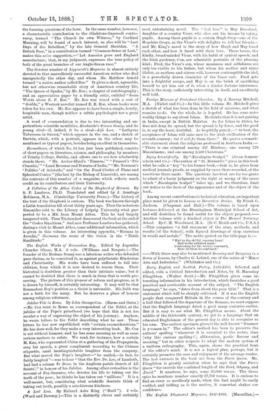Early English and Scottish Poetry, 1250 - 1600. Selected and edited, with
a Critical Introduction and Notes, by H. Macaulay Fitzgibbon. (Walter Scott.)—Mr. Fitzgibbon gives some in- teresting information in his introduction, which furnishes a good practical and serviceable account of the subject. "The English language," he says, "dates from about the year 1230." That is a statement which will be sharply criticised. If it was the English people that conquered Britain in the course of the century and a half that followed the departure of the Romans, we must suppose that the English language dated a good many centuries earlier. But it is easy to see what Mr. Fitzgibbon means. About the middle of the thirteenth century, we get to a language that an educated Englishman of the present day is able to recognise as his own. The earliest specimen given is the well known "Summer is y-comen in." The editor's method has been to preserve the authors' spelling "whenever it is essential to the metre, rime [why this curious spelling ?], alliteration, poetic flavour and meaning," but in other respects to adopt the modern system of a uniform orthography. This, again, shows the practical bent of the editor's mind. It is not a logical plan, perhaps, but it certainly promotes the ease and enjoyment of the average reader. The last extracts in the book are from the Faerie Queen. Mr. Fitzgibbon is greatly mistaken when he says that the Faerie Queen "far exceeds the combined length of the Iliad, Odyssey, and ,Eneid." It numbers, he says, some 35,000 verses. The three
epics he mentions number exactly 37,783 verses. It is curious to find an error so needlessly made, when the fact might be easily verified, and trifling as is the matter, it somewhat shakes our confidence.


















































 Previous page
Previous page